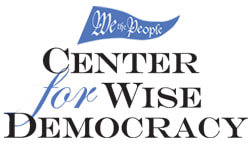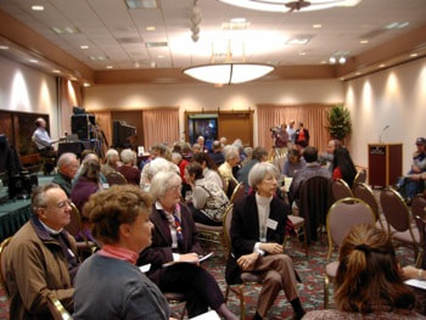What is the Wisdom Council Process?
The Wisdom Council Process is a way to facilitate a large System of people into the spirit of choice-creating so they can solve impossible-seeming problems. It's a way to facilitate "the people" of a System to come together, face difficult issues and reach shared perspectives. Over time, this is a way to facilitate a new form of democratic governance, "Wise Democracy," where an inclusive new entity, "We the People," comes into existence and assumes ultimate authority. This is what happened in the eighteenth century during the founding moments of the United States.
The way it works is that, periodically maybe every month or quarter, ten to sixteen members of the community, organization or network are randomly selected and brought together. They meet for a short time (e.g. a day and a half) as a Wisdom Council. Each Wisdom Council is provided with or identifies an issue of vital importance to the community whether solvable or not. Then the Wisdom Council meets in private where someone skilled in Dynamic Facilitation helps them engage the issue in the spirit of “choice-creating." Ultimately through shifts and breakthroughs they achieve unity on what's the real problem and how should we address it. Then they present their shared perspective back to the whole community in a ceremony, along with the story of how they reached this unity. Then everyone in the community or organization can reflect on what they've heard, hopefully in small group conversations. After the presentation and whole-system conversation, in practice we find that most everyone reports ... "Yes, I think so too!".
Then this process repeats with a new random group, who may pick up the same issue and carry it forward another step or some new issue. Through this process all the people get involved in the new community-building conversation, make progress on "impossible" issues and establish shared understandings and perspectives. Just the existence of this new ongoing conversation is a structural change to the system, because a "We the People" comes into being as the rightful wise ultimate authority. The Wisdom Council Process can be applied to all levels of the system—communities, NGO's, cities, nations, networks, corporations, schools and even to the global system.
The way it works is that, periodically maybe every month or quarter, ten to sixteen members of the community, organization or network are randomly selected and brought together. They meet for a short time (e.g. a day and a half) as a Wisdom Council. Each Wisdom Council is provided with or identifies an issue of vital importance to the community whether solvable or not. Then the Wisdom Council meets in private where someone skilled in Dynamic Facilitation helps them engage the issue in the spirit of “choice-creating." Ultimately through shifts and breakthroughs they achieve unity on what's the real problem and how should we address it. Then they present their shared perspective back to the whole community in a ceremony, along with the story of how they reached this unity. Then everyone in the community or organization can reflect on what they've heard, hopefully in small group conversations. After the presentation and whole-system conversation, in practice we find that most everyone reports ... "Yes, I think so too!".
Then this process repeats with a new random group, who may pick up the same issue and carry it forward another step or some new issue. Through this process all the people get involved in the new community-building conversation, make progress on "impossible" issues and establish shared understandings and perspectives. Just the existence of this new ongoing conversation is a structural change to the system, because a "We the People" comes into being as the rightful wise ultimate authority. The Wisdom Council Process can be applied to all levels of the system—communities, NGO's, cities, nations, networks, corporations, schools and even to the global system.
|
Many experiments have shown that this process works. For instance, two state governments in Austria have adopted the Wisdom Council Process (In German it's called a "Bürgerat," which translates to "Citizens Council") into their constitutions. (See seven short videos posted in English on the website from the State of Vorarlberg) Plus there have been national experiments in Germany and Austria.
The projected benefits of the Wisdom Council Process are over-the-top-good. The costs are low. And the risks are hard to find. Most objections come from people who can't imagine it working. But it does.
|
Dr. Manfred Hellrigl describes how his department OFRI in Vorarlberg, Austria uses the Wisdom Council Process
|
Ned Crosby, Democracy pioneer, asks Jim Rough about the Wisdom Council Process
Ned Crosby developed the Citizens Jury, the Citizens Initiative Review and originated the Jefferson Center for New Democratic Processes and Healthy Democracy Oregon. He and Jim are long time friends. (Sadly, Ned passed on May 30, 2022)
Additional resources
|
Wise Democracy vs "Deliberative Democracy"People often assume that the Wisdom Council Process is another example of a "Citizens Deliberative Council" like the Citizens Assembly or Citizens Jury. a part of the "Deliberative Democracy" movement. But no. Deliberation is based in judgment and choice-creating is based in creativity. See these charts of comparison:
|
Be a supporter. Donate to the Center for Wise Democracy! ... All donations are tax-deductible.
We are a 501-c3 organization.
We are a 501-c3 organization.

